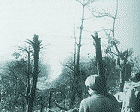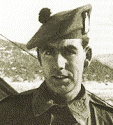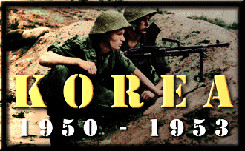The King's Own Scottish Borderers

In April 1951, the 1st KOSB was sent from Kong Kong to join the UN forces in Korea, arriving at Inchon on 23rd April 1951. The Borderers went into action immediately on reaching the front, but almost right away began a withdrawal, along with the whole UN force. The Borderers were part of the Commonwealth Division that adopted a sector on the Imjin River, along the 38th Parallel, and firm defensive positions were immediately established. In Late September, there was a general advance by the UN and on 3rd October, the KOSB fought a battle to gain possession of Hill 355. A new line was set up and was frequently attacked for the remainder of October.
On 4th November, the Chinese launched their 'Gunpowder Plot' offensive against the KOSB's positions with 6,000 men. During this battle Private Speakman won a VC and the enemy's attack failed, costing the Chinese more than 1,000 dead, while the borderers had 7 killed, 87 wounded and 44 missing. After this battle, the Borderers were withdrawn and moved to another sector. They left Korea in August 1952.
Gunpowder Plot
On Sunday, November 4, the Chinese Communists launched 6,000 men in an all-out attack on a vital two-hill ridgeline position on the 1st Commonwealth Division's front. The attack - named by the troops 'Charlie Chinaman's Gunpowder Plot' because it came on the eve of Guy Fawke's Day- fell furiously on three companies of the 1st Battalion, the King's Own Scottish Borderers. The KOSB was holding a 3,000-yard front. The positions ran along ridges roughly shaped like a broad arrow. The whole position was formerly part of the Chinese winter defence line, which a month previously had been stormed and captured during a five-division Allied advance that had included the Commonwealth Division's successful debut as a self-contained and complete Division. At one point, the line held by the KOSB was only 300 yards from the Chinese.
The Battle

On Sunday November 4th, increased Chinese activity in the area plus increased artillery fire, raised suspicions that the Chinese were about to attempt something. Three air strikes, plus an artillery barrage, were laid on by the Allies against the Chinese-held ridges opposite the KOSB's line. By noon, when the Chinese began firing airburst rounds, it was clear that an attack was about to be launched, although in what strength the attack would be was uncertain. The Chinese directed air burst shells at positions, including battalion headquarters and supply points, immediately behind the front line to disorganise the support for the KOSB. At about 4pm, the heavy barrage increased in intensity. The Chinese, in one hour, poured six thousand rounds onto the KOSB's trenches. The Chinese barrage continued even when their own infantry reached the KOSB's lines and engaged the Borderers.
In the failing light, the Chinese gained a stronghold on the hinge of the KOSB's line, Hundreds of Chinese fell upon two platoons at this hinge in the line, which slogged it out against the Chinese. At 2am, the platoons contacted their battalion and were ordered to withdraw. The remnants fought their way out from the encircling Chinese and brought their wounded comrades with them. Armed jeeps forayed into the Chinese lines looking for any KOSB's who may have been left behind, and it is believed that very few wounded fell into Chinese hands.
During the attack, Fusilier ******* ***** a member of the KOSB, had cowered in the bottom of his trench unable to take action, sidling off to another trench from his own position and being unwilling or unable to fight. He was subsequently court-martialled after the battle, jailed for a year, and discharged with ignominy.
When Charlie Company fell back from the central hinge position, there was nothing between the battalion's mortar platoon and the Chinese. The mortar platoon continued to fire as ordered, its six mortars firing about five thousands bombs at the Chinese in eight hours before retiring as the Chinese closed in. Of the two regiments involved, the KOSB's reported three officers wounded and one missing, seven others ranks killed and 81 wounded. The Royal Leicestershire Regiment sustained nine killed and 58 wounded.
Private W. Speakman VC

During the 'Gunpowder Plot' battle of Sunday 4th November, Private William Speakman, with the aid of six men from his battalion, organized an attack that held the Chinese attack off. Testimonies from witnesses said Private Speakman was fighting on the ridge top, tossing grenades at the Chinese, as they climbed towards the KOSB's positions. When he ran out of grenades, he ran down to the ration pit, grabbed a new supply of grenades and returned to the ridgeline to resume his assault on the Chinese. When a machine gun was knocked out and in danger of being overrun by the Chinese, Speakman organized his men to defend the weapon and prevent the Chinese turning it on the KOSB. His action gave his company time to withdraw to safety.
Court-Martial
The following has been taken from an unidentified British newspaper of the time. The article concerns the Court Martial of a Private of the 1st Battalion, the King's Own Scottish Borderers for cowardness in the face of the enemy. We have removed the name of the Private.
Heavy Assault
Sitting in the Court when *****, a tall, well-built man, was marched in were his brother and sister. The President was Brigadier L. F. Martin, and the Judge Advocate was Lord Russell of Liverpool. Captain R. G. Lomer, prosecuting, said, "On October 3 1951, the 1st Battalion, the King's Own Scottish Borderers, advanced in a difficult and somewhat severe operation that carried them on to the top of the high ground.'
'A heavy counterattack was expected. On the morning of November 4 1951, shell fire stiffened up very considerably and about 4 o'clock in the afternoon turned into a really major barrage, one of the heaviest of the Korean war- 6,000 shells per hour, followed by the classical infantry assault: attacked with the point by a full division, about 6,000 men.'
'The attack first overran 8 Platoon and then swung on to 9 Platoon. Eventually 'C' Company, after very gallant fighting, was overrun. That left 'D' and 'B' Companies on the wings.'
'They put up a most gallant and distinguished resistance. It was here Speakman won his V.C. They were fighting back with beer bottles and everything. They held a full divisional attack with very serious casualties. It was a very major battle.'
Reprimanded
Captain Lomer said,' ***** was in a silt trench with Corporal Braid and two other soldiers. One man in each trench had his head up, looking for the enemy. Corporal Braid will tell you that ***** did not perform his duty satisfactorily and that he had to reprimand him for lying down in the trench and not keeping a proper lookout for the enemy.'
'Then ***** left the trench and sidled off,' said Braid -saying something that cannot be remembered now - and went towards Platoon HQ. Braid ordered him back but he did not return.
'***** left his rifle, grenades and equipment behind. After an interval he arrived in Lieut. Pateman's trench. Pateman was single-handed and using a Bren gun. ***** lay down in the trench.'
'Pateman will tell you that he ordered him to get up and fight and look for some grenades, but he could not get him up.'
Might Break Down
Replying to Mr. Philip Niman, defending, Col. Tadman said he had formed the opinion that ***** was not a very good soldier. ***** was superficially wounded on Oct. 3 1951, and returned to the line after about three weeks absence.
Mr. Niman - "Unless you are fighting fit you are no use there (in the line)?' 'No, I had men not 100 per cent fit, but they were fighting.'
Mr. Niman asked if he agreed with Brigadier Rawlings, consulting psychiatrist to the Army, that a dullard among men of high intelligence began quickly to feel himself inferior, and from this developed anxiety? 'No.' replied the Colonel.
'Do you agree that he might soon break down or might malinger?' 'I have found that on occasions.'
'Broadly speaking any man might break down, granted there are sufficient pre-disposing causes?' 'Yes, Any of us might.'
Out of Hospital
Major T. Little, who was in command of C Company said that when the company position was no longer tenable he ordered the remnants of his men back to form a new position.
Captain Lomer- 'You yourself were delayed helping a wounded officer back?'
'Yes, sir.'
'Was ***** among the few men that were left?'
'No.'
He had known ***** for about four months before the action. He was an average soldier. He had been wounded on Operation Commando on October 3.
Mr. Niman-'He says you were very kind to him and helped him on that day?'
'I cannot remember. It is possible.'
Major Lydon said,'***** was sent to hospital.'
Mr. Niman-'Did he come back from hospital three days before this extremely fierce barrage?'
'That is so. I presumed he was pronounced fit.'
'Brigadier Martin. When you came back to the Battalion position were the chaps with you bright, average or dullards? Was it only the bright ones who stuck it?'
'It was a cross-section of the company. Some were dumb, some were bright.'



